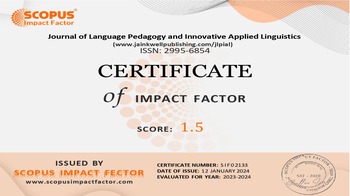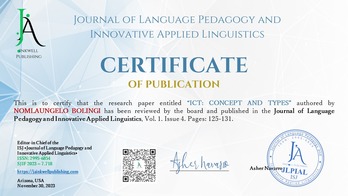Embracing the Power of Collaborative Online Learning: Unveiling the Benefits of Studying with Peers
DOI:
https://doi.org/10.1997/8g6gpp68Keywords:
collaborative learning, dynamic learning environment, engagement, cultivate, participation, critical thinking and problem-solving skills, facilitating peer-to-peer learningAbstract
This abstract explores the transformative advantages of collaborative online learning in modern education. It delves into the dynamic environment facilitated by this approach, fostering active engagement, inclusive participation, and peer-to-peer learning. The abstract highlights how collaborative online learning enhances critical thinking, problem-solving abilities, and prepares students for real-world collaboration. Ultimately, it emphasizes the pivotal role of this methodology in shaping a generation of adaptable, globally connected learners equipped with essential skills for success beyond academia.
Downloads
References
Goodsell, A., Maher, M., & Tinto, V. (Eds.). (1988). Collaborative learning: A sourcebook for higher education. University Park: National Center on Postsecondary Teaching, Learning, and Assessment, Pennsylvania State University.
Cockrell, K. S., Caplow, J. A., & Donaldson, J. F. (2000). A context for learning: Collaborative groups in the problem-based learning environment. Review of Higher Education, 23, 347– 364. doi:10.1353/rhe.2000.0008
Raver, S. A., & Maydosz, A. S. (2010). Impact of the provision and timing of instructor provided notes on university students’ learning. Active Learning in Higher Education, 11, 189–200. doi:10.1177/1469787410379682
Davidson, N., & Worsham, T. (1992). Enhancing thinking through cooperative learning. New York, NY: Teachers College Press.
Connell, J. P., & Wellborn, J. G. (1991). Competence, autonomy, and relatedness: A motivational analysis of self-system processes. In M.R. Gunnar & L.A. Sroufe (Eds.), Minnesota symposium on child psychology: Self-processes in development, Vol 23 (pp. 43-77). Chicago: University of Chicago Press
Griffiths, S., Houston, K. & Lazenbatt, A. (1995) Enhancing Student Learning Through Peer Tutoring in Higher Education, Coleraine: Educational Development Unit, University of Ulster.
Boud, D. (1988) 'Moving towards autonomy', in D. Boud (ed). Developing Student Autonomy in Learning. Second Edition. London: Kogan Page.
Mohd Sohod, S.N. (2013) Penguasaan Kemahiran Berfikir secara Kritis dan Menyelesaikan Masalah dalam Kalangan Pelajar Sarjana Muda di Universiti Tun Hussien Onn Malaysia [Mastery of Critical Thinking and Problem-Solving Skills among Undergraduate Students at Universiti Tun Hussien Onn Malaysia]. Tesis Sarjana Universiti Tun Hussien Onn Malaysia.
Piaget, J. (1950). The psychology of intelligence. New York, NY: Harcourt.
Johnson, D. W., & Johnson, R. T. (2002). Social interdependence theory and university instruction: Theory into practice. Swiss Journal of Psychology, 61, 119–129. doi:10.1024// 1421-0185.61.3.119
Terenzini, P. T., Cabrera, A. F., Colbeck, C. L., Bjorklund, S. A., & Parente, J. M. (2001). Collaborative learning vs. lecture/discussion: Students’ reported learning gains. Journal of Engineering Education, 90, 123–130. doi:10.1002/j.2168-9830. 2001.tb00579.x
Bruffee, K. A. (2003). Collaborative learning and the ‘conversation of mankind.’ In V. Villanueva (Ed.), Cross-talk in comp-theory: A reader (pp. 415–436). Urbana, IL: National Council of Teachers of English.
Castle, T. D. (2014). The impact of cooperative learning on the development of need for cognition among first-year college students (Doctoral dissertation). Retrieved from http:// ir.uiowa.edu/etd/1437
Johnson, D. W., Johnson, R. T., & Smith, K. A. (1998). Cooperative learning returns to college: What evidence is there that it works? Change: The Magazine of Higher Learning, 30 (4), 26–35. doi:10.1080/00091389809602629
Springer, L., Stanne, M. E., & Donovan, S. S. (1999). Effects of small-group learning on undergraduates in science, mathematics, engineering and technology: A meta-analysis. Review of Educational Research, 69, 21–52. doi:10.3102/00346543069001021
Cabrera, A. F., Nora, A., Bernal, E. M., Terenzini, P. T., & Pascarella, E. T. (1998, November). Collaborative learning: Preferences, gains in cognitive & affective outcomes, and openness to diversity among college students. Paper presented at the annual meeting of the Association for the Study of Higher Education, Miami, FL.
Downloads
Published
Issue
Section
License
Copyright (c) 2023 Zulfizar Rakhimova, Javoxir Barotov (Author)

This work is licensed under a Creative Commons Attribution 4.0 International License.












